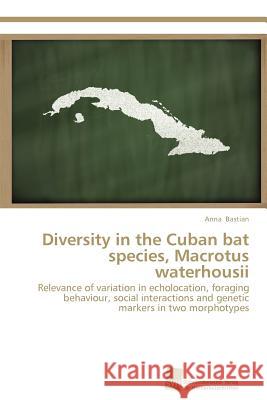Diversity in the Cuban bat species, Macrotus waterhousii » książka
Diversity in the Cuban bat species, Macrotus waterhousii
ISBN-13: 9783838135595 / Angielski / Miękka / 2012 / 184 str.
How do evolutionary processes shape animals into different lineages forming the biodiversity that we find today? Questions like these drive my enthusiasm to do research projects as presented here. The bat species M. waterhousii which apparently occurs as distinct morphotypes, appears to be a promising candidate to understand and study the forces driving the evolution of this Genus. My multidisciplinary approach aims to identify and assess the influence of morphology, echolocation behaviour, social interactions and molecular genetics as evolutionary forces acting in concert shaping the Macrotus population on Cuba. Morphological and echolocation variability was documented during extensive field work and their consequences for foraging and manoeuvring behaviour were tested in experiments of a captive colony. This then informed about the adaptive potential of the observed variation in contrast to drift which represents neutral evolution. Acoustic differences between social calls of groups may indicate ethological barriers based on the non-recognition of the others calls. Finally, differences in mitochondrial genetic markers confirmed, at the molecular level, divergence between groups.
How do evolutionary processes shape animals into different lineages forming the biodiversity that we find today? Questions like these drive my enthusiasm to do research projects as presented here. The bat species M. waterhousii which apparently occurs as distinct morphotypes, appears to be a promising candidate to understand and study the forces driving the evolution of this Genus. My multidisciplinary approach aims to identify and assess the influence of morphology, echolocation behaviour, social interactions and molecular genetics as evolutionary forces acting in concert shaping the Macrotus population on Cuba. Morphological and echolocation variability was documented during extensive field work and their consequences for foraging and manoeuvring behaviour were tested in experiments of a captive colony. This then informed about the adaptive potential of the observed variation in contrast to drift which represents neutral evolution. Acoustic differences between social calls of groups may indicate ethological barriers based on the non-recognition of the others calls. Finally, differences in mitochondrial genetic markers confirmed, at the molecular level, divergence between groups.











